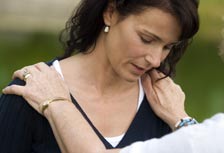Drug Rehab for Women
Drug and Alcohol Rehab for Women
 A Center for Addiction Recovery offers drug and alcohol rehab for women. Our women addiction treatment program is both gender and trauma-specific. Our therapeutic interventions address issues of domestic violence, sexual and physical abuse, as well as relationship and parenting issues. Addressing a full range of women's needs, the women's addiction treatment program combines clinical treatment, clinical support, and community support services. These services are enhanced with case management, transportation, referrals for services in the community, as well as recovery support and relapse prevention.
A Center for Addiction Recovery offers drug and alcohol rehab for women. Our women addiction treatment program is both gender and trauma-specific. Our therapeutic interventions address issues of domestic violence, sexual and physical abuse, as well as relationship and parenting issues. Addressing a full range of women's needs, the women's addiction treatment program combines clinical treatment, clinical support, and community support services. These services are enhanced with case management, transportation, referrals for services in the community, as well as recovery support and relapse prevention.
A Center for Addiction Recovery combines the best of Western bio-medical care and psychotherapy with Eastern holistic complementary therapies, including: drug detox, massage, light bodywork, yoga, acupuncture and art therapy. Our comprehensive addiction treatment programs for women aim to treat the whole person, as in both mind and body. In order to do so, we utilize a range of treatment perspectives--from medical to psychological assessments.
We consider each case for every woman in our facility to be unique. Therefore, an individualized treatment plan is established after thorough consultations between our experienced licensed practitioner and the client is completed.
One of our highly successful women's addiction treatment programs is the holistic approach to treatment. This approach requires a coordinated, multi-disciplinary effort with all our practitioners liaising weekly--sometimes daily--to ensure seamless integration of all therapies involved in our addiction treatment.
At A Center for Addiction Recovery, our women addiction treatment therapies are done in accordance with an overall program strategy--devised, maintained, and monitored by our Clinical Director and the senior psychotherapy team.
Addiction Treatment Therapies for Women Include:
Medical Addiction Treatment, Psychotherapy, Individual Therapy, Group Therapy, Grief/Loss Therapy, Family Therapy, Trauma Therapy, and Relapse Prevention.
Alternative Addiction Treatment Therapies for Women Include:Art Therapy, Physical Exercise, Drug Detox, Massage Therapy, Auricular Acupuncture and Yoga.
Addiction Treatment for Pregnant Women
A Center for Addiction Recovery provides specialized addiction treatment services for pregnant women. Our addiction treatment services for pregnant women offers the same gender-specific services encountered at our women's addiction treatment, plus prenatal and post partum services such as transportation to and from a clinic/hospital, where prenatal care services are provided. Our drug and alcohol rehab programs for pregnant women offer specialized addiction treatment that addresses specific needs of women who may also be involved with The Department of Children and Families. We also provide recovery support groups for all pregnant patients who wish to seek extra help from the community and/or from outreach programs--either directly or by referral.
The overall goal for the future mothers of our women's addiction treatment program is a sustained and healthy unification of them with their child/children. For more information about our addiction treatment services for pregnant women, please contact us at
Women and Substance Abuse
Women, more often than men, have been introduced to substances and continue to use illegal substances with their spouses or partners who may also be physically or sexually abusive. Many times women have little emotional support or financial resources to pay for addiction treatment, including childcare and transportation, which makes it difficult for them to enter and remain in treatment. Additionally, women are more likely to have experienced trauma and use substances to cope with those experiences. Women are more likely to have mental health problems such as anxiety, depression, or post-traumatic stress disorder. Women generally have fewer resources in terms of education, employment and finances available to them. Finally, pregnant and parenting women using substances face particular societal disapproval, and pregnant women often delay getting help from addiction treatment services, which may cause serious implications for themselves and their baby.
It is not east to get a full understanding of women's use of substances and related problems, since the majority of studies in prevention and treatment research does not address gender-specific issues. Although the available studies indicate that women are generally less likely than men to use illicit substances, still, they are more likely than men to abuse prescription drugs. In terms of physiological differences, there is evidence that women, in comparison with men, may become dependent quicker on a number of illicit and legal substances; in addition, they may engage in more HIV-risk behaviors and have higher mortality rates if they inject drugs. It is also known that psychoactive substances often affect women differently, depending on their menstrual cycle and whether they are pregnant or not. Women's use and abuse of drugs and alcohol can result in their baby having low birth weight, early delivery, and poor nutritional status.
Fortunately, studies of comprehensive or enhanced addiction treatment programs, specifically designed to meet women's needs, have found improved recovery outcomes. Data shows that when a comprehensive assessment is performed, and a women-centered addiction treatment plan is put in place, the effectiveness of treatment and recovery is greatly improved.
Our treatment programs offer psycho-social treatment, as well as cognitive and behavioral dimensions, including: coping skills, relapse prevention, relational work, trauma, and other concurrent mental-health problems for women. Incorporated in our women focused programs are childcare, prenatal care, parenting skills, and workshops that address women-specific topics, such as: issues concerning partners, family relationships & responsibilities, pregnancy, high-risk behaviors, trauma history, and mental health problems.
Please call and talk to one of our licensed therapists regarding specifics of our treatment programs, designed specifically for women struggling with substance abuse.





